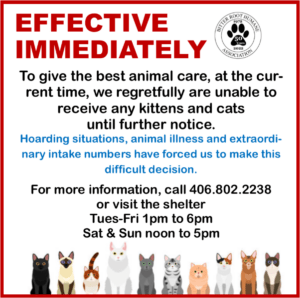
The Bitter Root Humane Shelter in Hamilton is completely full, according to Kathie Butts, president of the board. The shelter is not accepting cats at this time and Butts said they will be implementing a new policy to help alleviate the current situation when they start accepting cats again.
As of last week, the animal shelter had 119 cats and more than 40 dogs. “It’s not just us,” said Butts. “It’s common through most shelters in the U.S. right now. I don’t know if it’s pandemically caused, or caused by population shifts.” She said it could be that people who have moved here are having trouble finding rentals that accept pets. When they finally find someplace to rent, their animals end up at the shelter.
Also, said Butts, people are feeding cats that they think have no homes. People feed them during the day and then end up catching them and bringing them to the shelter.
Butts said there is a way to make a warm cat area from an insulated cooler. “We put out the call for coolers, and now we have 15 and so anyone who is helping outside cats can come get one and set them up so cats can stay in them at night and not freeze.”
“We’re going to change the way we’re handling animals,” said Butts, “and we’re going to start with cats.”
First, the animal shelter is temporarily closed to any new cats. When the shelter starts accepting cats again, people will need to call to make an appointment to bring in a cat. Butts said when they call, shelter staff will ask what the shelter can do to help them care for the animal until the appointment time.
“We’re trying hard to make sure we have a healthy cat population,” said Butts. “Overcrowding of cats causes illness. If we can keep them healthy, they have a better chance of being adopted.”
The Bitter Root Humane Shelter does not euthanize for lack of space or for duration of stay. Butts said they only euthanize for habits that can’t be broken, like serious biting. Or animals that are very sick.
“We’ve had some animals for years,” Butts noted. “We had a dog named ‘Gregory’ who was with us for two or three years.”
The Bitter Root shelter is part of a northern tier organization of shelters that includes the northern states. There is a facebook page for the northern tier where shelters can post animals available to trade for other animals that might get more interest here. For example, said Butts, they get a lot of big dogs at the Hamilton shelter, but not as many small dogs. “So we could trade them,” said Butts. She said that occasionally, another shelter might have space for some animals that they could send there. “But right now everybody’s full,” said Butts.
She said they are also still seeing some hoarding situations with cats, places where there are multiple animals that have been collected and they become a problem when they’re not taken care of. “But, we take ‘em!” said Butts. “That’s what we do. And it’s better that we take them rather than infect other cats that are around.”
Cats get traumatized easily and that’s when they get sick, according to Butts. She said that cats get a virus that works something like shingles in people. When they’re stressed it comes out as an illness and is contagious to other cats. “So we have to quarantine cats,” said Butts.
“Right now we have one total isolation room and one quarantine room. We are going to have to temporarily close the shelter to cats until we can get them healthy. That’s when the by-appointment policy will start. That will help us be able to move things around so the cats stay healthy.”
The shelter is also overflowing with dogs, with overflow dog kennels in the hall. In addition to housing issues, Butts said the rising cost of keeping a dog is now a factor. “Dog food is not cheap,” said Butts. “Special food for medical issues in pets is very expensive. When those animals come into the shelter they need that special food. We keep these animals because they are healthy when they eat the special food.”
“People like animals and animals like people, and sometimes you’re not able to look forward enough to what’s going to happen in your life,” said Butts, and that includes the potential cost of caring for pets.
Butts remembered all the work that Dr. Applebury did with the Fox Hollow Project, going out and live trapping the feral cat population and spaying and neutering them. She said they aren’t able to do that anymore. “It really made a difference,” said Butts.
Butts said that the Bitter Root Humane Shelter has started a spay/neuter program for cats and dogs in the shelter but they aren’t set up to go out and trap animals. “It would be so nice if the public would help out and spay and neuter their animals,” she said. “We’re trying for a grant so we can help people with that cost. But it takes time to get that together.”
She added, “We significantly increased the size of our shelter, and now look, we’ve only had it for two years and we’re already full.”
Anyone considering dropping off an animal at the Bitter Root Humane Shelter, particularly a cat, should call first to make an appointment at (406)363-5311.